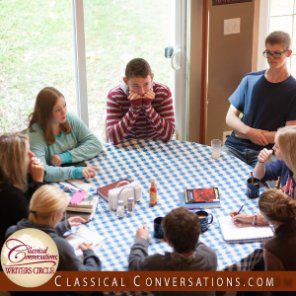So you have a child in Challenge class and you aren’t sure exactly what’s going on there. You know they are reading a lot of books, studying Latin, and learning math, science, and history. You wonder, though, “What exactly are they doing during class?”
Perhaps you don’t have a child in Challenge class and you wonder what in the world they are being prepared for. What do they do when they get to Challenge? Is it worth continuing with Classical Conversations beyond Foundations and Essentials? Beyond Challenge B? Beyond Challenge II?
It is. It is, precisely because of what they are doing in class. So let’s take a look at what that is.
When our children get to Challenge, they start using two tools more than they previously used them: dialectic and rhetoric. Dialectic is the art of conversation, dialogue, and debate. Through the use of these tools, our children discover truth. Rhetoric is the art of communicating, through presentations and writings, the truth they have discovered.
Those of you who are familiar with the Foundations and Essentials programs know that while sitting in class with your little one, you have seen them practice the art of dialectic: engaging in conversation about the rules of English grammar, for example. You have also seen them practice the art of rhetoric: giving presentations in Foundations or sharing their written papers in Essentials.
When our children reach Challenge, they start spending more of their time with the dialectic. Seminar time, the time they spend in class at community, becomes more about practicing the art of dialectic than it does reviewing the grammar of the content. As they mature, our children are more responsible to take on the content, grammatically, at home and then bring that content into class for discussion, dialogue, and debate. So what does that discussion, dialogue, and debate look like?
It’s a conversation, a part of the great classical conversation that has been going on for all of western cultural history. As a conversation, it is personal. They are interacting with tutor and peers as individuals with their own understanding, their own experiences, their own feelings, their own circumstances and context. This means they have the opportunity to draw out and discover truths that will be meaningful to them.
It’s a conversation, not concurrent monologues. Untrained in the art of dialectic, many adults don’t know how to have a conversation. They simply give a monologue which the other person doesn’t listen to because they are formulating their own monologue in their head. Then, while that person responds with his monologue, the first person begins formulating his next monologue. Sometimes, the “conversation” partners don’t even bother to wait and they begin their monologues simultaneously! Our children are practicing listening to one another before they begin formulating their response. They are not engaging in concurrent monologues, but in genuine conversations.
It’s a conversation, not a contest. While our students may have preconceived ideas about what is true or right, the conversation allows them to enter into the understanding, experiences, feelings, circumstances, and context of their conversation partners and see things from their perspective. This allows them to develop sincere compassion and sympathy in an attempt to understand, bringing them to a fuller grasp and understanding of truth. Truth, then, becomes something all parties are striving for, together, rather than the “win” in a particular contest. In other words, the conversation leads to the discovery of truth rather than the defeat of another person.
It’s a conversation about anything that has truth worth discovering; it’s not a boring lecture. Our students learn to discover, for example, the principles of a math concept or problem by asking questions, hearing what questions others ask, and feeling out the validity of the answers others suggest. Discovering how something works, even a math concept, is far more valuable and meaningful to a student than having it delivered to him. I’ve had students in seminar look up a Latin translation in the answer key, the same grammatical concept, several times and not remember it. Then, after one week of asking questions and wrestling with the concept apart from the answer key, the concept having been discovered, creates a long-lasting impression, a memory, in their minds that they never have to look up again. This is what discovery does, and discovery happens through the conversation.
Imagine a world with politicians, pundits, reporters, and marketers who are not so interested in elections, controversies, ratings, and sales, but are more interested in hearing from another person because they are a person—made in the image of God!—and together, with that person, discovering truth and communicating it well. These are the kind of children we want to raise: children who will go into the world with the skills to converse well, to treat others with the respect they deserve, in service of the Truth.
This is what our children are doing in Challenge class. This is what our children will be doing in Challenge class when they get there. This is what our children will be losing if they lack the arts of dialectic and rhetoric. This is what the world will be losing if our children enter it without these arts.




